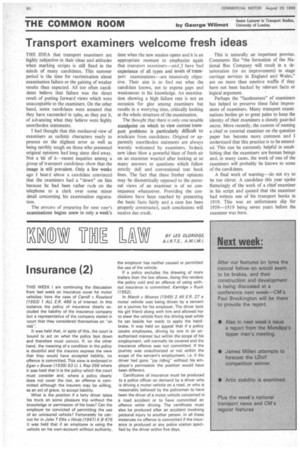Transport examiners welcome fresh ideas
Page 62

If you've noticed an error in this article please click here to report it so we can fix it.
THE IDEA that transport examiners are highly subjective in their ideas and attitudes when marking scripts is still fixed in the minds of many candidates. This summer period is the time for recrimination about examination failure or the gaining of weaker results than expected. All too often candidates believe that failure was the direct result of putting forward views which were unacceptable to the examiners. On the other hand, some candidates were amazed that they have succeeded in spite, as they put it, of advancing what they believe were highly unorthodox statements.
I had thought that this mediaeval view of examiners as sadistic charapters ready to pounce on the slightest error as well as being terribly tough on those who presented original opinions had long since died away. Not a bit of it—recent inquiries among a group of transport candidates show that the image is still prevalent. Only a few weeks ago 1 heard about a candidate convinced that the examiners had a "down" on him because he had been rather rude on the telephone to a clerk over some minor detail concerning his examination registration.
The process of preparing for next year's examinations begins anew in only a week's
time when the new session opens and it is an appropriate moment to emphasize again that transport examiners—ant-1J have had experience of all types and levels of transport examinations—are intensively objective. Their aim is to find out what the candidate knows, not to expose gaps and weaknesses in his knowledge. An examination showing a high failure rate is not an occasion -for glee among examiners but results in a worrying time, critically looking at the whole structure of the examination.
The thought that there is only one tenable standpoint on which to view current transport problems is particularly difficult to eradicate from candidates. Original or apparently unorthodox statrnents are always warmly welcomed by examiners. Indeed, new ideas blow a powerful blast of fresh air on an examiner wearied after looking at so many answers to questions which follow strictly dull and conventional text book lines. The fact that these fresher opinions may be diametrically opposed to the personal views of an examiner is of no consequence whatsoever. Providing the conclusions have been reached by presenting the basic facts fairly and a case has been properly constructed, such conclusions will receive due credit. This is naturally an important proviso. Comments like "the formation of the National Bus Company will result in a deterioration (or an improvement) in stage carriage services in England and Wales," are no more than emotive waffle if they have not been backed by relevant facts or logical argument.
Perhaps the "facelessness" of examiners has helped to preserve these false impressions of examiners. Many transport examinations bodies go to great pains to keep the identity of their examiners a closely guarded secret. More recently, the custom of naming a chief or external examiner on the question paper has become more common and I understand that this practice is to be extended.• This can be extremely helpful in establishing that the examiners are human beings and, in many cases, the work of one of the examiners will probably be known to some of the candidates.
A final work of warning—do not try to be too clever. A candidate this year spoke flatteringly of the work of a chief examiner in his script and quoted that the examiner had written one of his transport books in 1919. This was an unfortunate slip for 1959-1919 being seven years before the examiner was born.




































































































